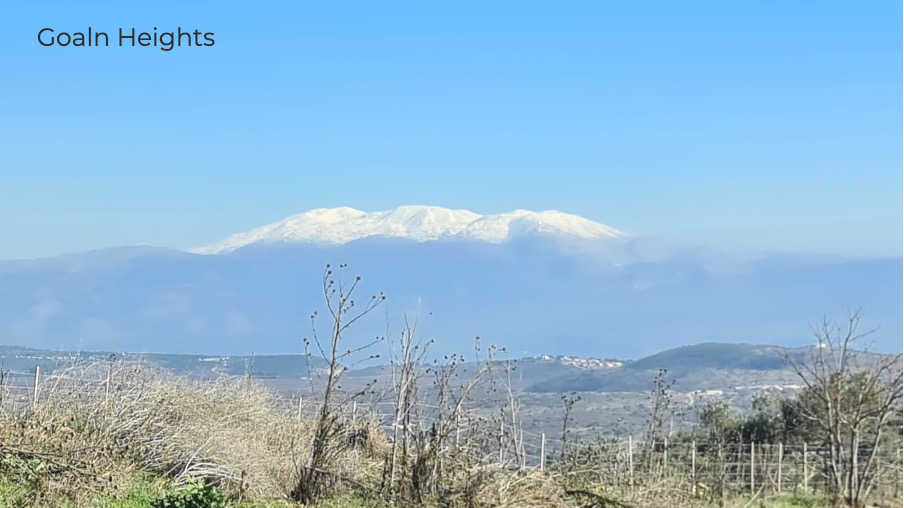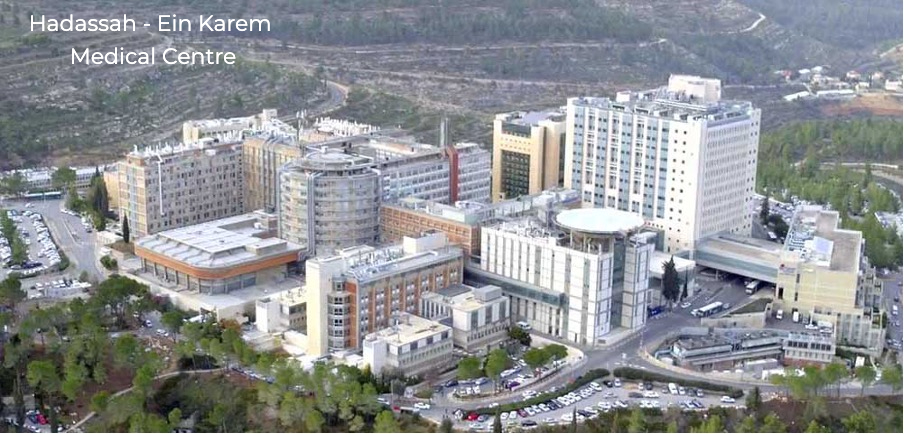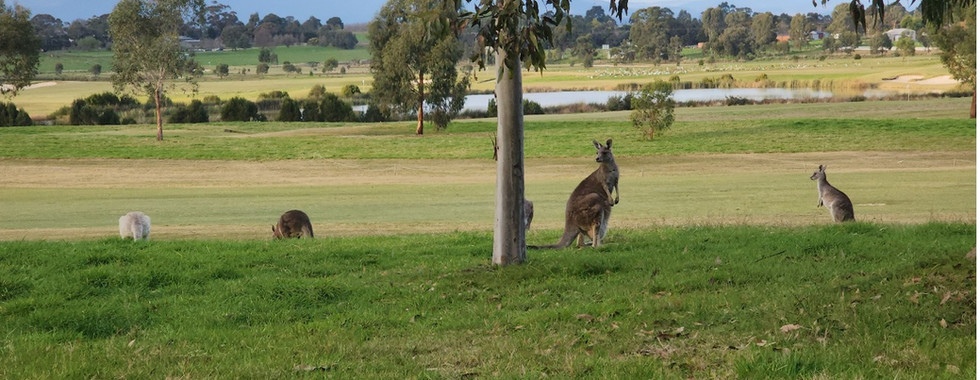A Journey of Growth:
- Fady Shoukair

- Apr 11, 2025
- 7 min read
My Experiences as a Trainee Surgeon at Hadassah Hospital, Jerusalem, and a Fellow Surgeon in Melbourne, Australia
Article from Australia
Throughout my career as a surgeon, two experiences stand out as truly formative and transformative: my training at Hadassah Hospital in Jerusalem, Israel, and my fellowship in Melbourne, Australia. Both experiences significantly influenced my professional development, enhanced my surgical expertise, and enriched my personal life. From pioneering medical environments to life-changing cultural exchanges, each chapter of my journey has shaped the surgeon I am today.

An Unforgettable Experience at Hadassah Hospital, Jerusalem
My time as a trainee surgeon at Hadassah Hospital in Jerusalem was a formative and highly impactful chapter in my medical career. Hadassah is one of the leading hospitals in Israel and is renowned for its clinical care, cutting-edge research, and diverse patient population. It was at Hadassah that I had the opportunity to complete both my Doctor of Dental Medicine (D.M.D.) and medical studies at the Hebrew University, which allowed me to integrate my knowledge across both fields and enhance my approach to patient care and surgery.
Hadassah's reputation for excellence in clinical care and surgery drew me in, but it was the daily encounters with complex cases and diverse medical conditions that truly expanded my knowledge and skill set. I worked in a multidisciplinary environment, exposed to a wide range of surgical specialties. The fast-paced nature of the hospital pushed me to think critically and act decisively, allowing me to develop a well-rounded understanding of surgery.
The multicultural environment in Jerusalem provided invaluable lessons in communication and understanding. I learned to appreciate how cultural factors can influence medical care and outcomes, which has since informed my practice as a surgeon. The experience taught me the importance of respecting patients' backgrounds while providing compassionate care.
The mentorship I received at Hadassah was exceptional, particularly from the head of the department, Prof. Casp, and my senior colleagues, who took a hands-on approach to teaching. Their guidance went beyond the operating room, offering insight into patient care, decision-making, and the challenges of managing complex cases. Their patient-centred approach to medicine inspired me to strive for excellence in everything I did.
Hadassah also placed a strong emphasis on research. As a trainee, I was encouraged to participate in clinical studies and contribute to the hospital’s ongoing efforts to advance medical knowledge. During this time, I completed a master’s degree in osteoimmunology, deepening my understanding of the scientific underpinnings of surgery and the importance of evidence-based practice.
Jerusalem’s rich history and spiritual significance provided a unique backdrop for my training. During my time off, exploring the city’s ancient streets, as well as enjoying the scenic beauty of other cities like Haifa and Tel Aviv, allowed me to recharge and experience the culture and landscapes of Israel. The stunning Mediterranean views in Haifa and the vibrant energy of Tel Aviv gave me more opportunities to relax and reflect on my journey.
However, the experience at Hadassah also presented challenges. The on-call shifts in Israel are notably longer than in many other countries, with shifts lasting up to 26 hours. During these shifts, residents and registrars are responsible for all aspects of oral and maxillofacial care, which can be exhausting and challenging, affecting the work-life balance. Despite the demanding schedule, the exposure to interesting cases during these night shifts helped me refine my surgical skills and prepared me for the complexities of patient care in a busy hospital environment.
Additionally, Hadassah emphasized ongoing medical education. Regular journal clubs, pathology meetings, and radiological meetings provided platforms for continuous learning and the exchange of knowledge. These forums allowed us to stay updated on the latest research, share case studies, and engage in meaningful discussions about patient care and treatment strategies. The opportunity to contribute to and learn from these multidisciplinary meetings was an invaluable aspect of my training.
A Rewarding Fellowship in Melbourne, Australia
After my time at Hadassah, I had the privilege of continuing my training as a fellow surgeon in Melbourne, Australia. This opportunity marked a new chapter in my career, offering a chance to build on the solid foundation I had established in Jerusalem. Melbourne is known for its high standards in healthcare, and it was the perfect environment for me to expand my expertise in the field of Oral & Cranio-maxillofacial surgery.
Melbourne’s healthcare system is renowned for its commitment to medical innovation and excellence. During my fellowship, I worked at some of Melbourne’s diverse hospitals, where I encountered a variety of complex cases that broadened my surgical skills. The exposure to advanced techniques and technologies further honed my surgical capabilities and allowed me to stay at the cutting edge of the field.
One of the most striking aspects of my experience in Melbourne was the emphasis on multidisciplinary teamwork. Surgeons, nurses, anaesthetists, and other healthcare professionals worked collaboratively, with patient care always being the ultimate priority. This environment of mutual respect and camaraderie fostered continuous learning, and I was encouraged to contribute my insights and ideas, further enhancing my surgical growth.
The mentorship I received in Melbourne was invaluable, particularly from Dr. Patrishia Bordbar, who leads the fellowship program. She, along with other senior surgeons, provided exceptional guidance during complex procedures. Their constructive feedback helped me refine my techniques and deepen my understanding of decision-making in surgery. The hands-on experience provided by my supervisors allowed me to apply my learning in real-time, further improving my proficiency.
Melbourne’s vibrant medical community also gave me the opportunity to engage in various research initiatives, advancing my understanding of the latest surgical advancements. Attending conferences and discussions with peers and thought leaders fuelled my curiosity and passion for continuous learning.
In Melbourne, I also participated in regular journal clubs, pathology meetings, and radiological meetings, similar to my experience in Jerusalem. These platforms allowed us to discuss the latest research, review interesting cases, and engage in critical discussions about surgical techniques and patient care. The multidisciplinary nature of these meetings mirrored my experience at Hadassah, reinforcing the importance of collaboration and ongoing education.
Beyond my professional development, Melbourne itself was an inspiring place to live. The city’s unique blend of art, history, and natural beauty provided a perfect backdrop for my work. Whether enjoying a coffee at a local café or exploring the stunning landscapes surrounding Melbourne, I was constantly reminded of the importance of balance in life, even in the demanding world of surgery.
From a family perspective, our time in Melbourne was equally fulfilling. Our son, Liam, was born during our stay, marking a special milestone for our family. Our daughter, Lana, thrived in the daycare program, quickly becoming fluent in English and developing her independence. We were able to explore the beautiful scenery of Australia together, from beaches to lush forests, creating lasting memories. My wife also had a fulfilling experience, successfully becoming a fully registered pharmacist and enjoying her work in Melbourne.
Reflecting on my time in Melbourne, I can confidently say it was a pivotal chapter in my career. The skills I acquired, the relationships I built, and the personal growth I experienced continue to shape my work as a surgeon today.
Looking back on my experiences at Hadassah Hospital in Jerusalem and as a fellow surgeon in Melbourne, I can truly appreciate how each chapter shaped both my career and my personal life. Hadassah provided a solid foundation, where I developed critical skills in a multidisciplinary, multicultural environment. Melbourne built on that foundation, offering new opportunities for professional growth, mentorship, and a unique cultural experience.
Both experiences reinforced the value of mentorship, teamwork, and continuous learning, and emphasized the importance of balancing professional life with personal well-being. I will forever be grateful for the opportunities I had in both Jerusalem and Melbourne, and I continue to carry the lessons I learned with me every day as I advance in my surgical career.
Tips Before Coming to Australia for a Fellowship:
Paperwork Processing: Allow at least six months for your paperwork to be processed. The most common visas you can apply for are the 482 or 470, both of which I held during my stay.
Home Affairs Processing: The Department of Home Affairs typically takes several months to process paperwork. Some hospitals may be generous enough to assist with this process, while others will require you to apply independently.
Maxillofacial Fellowship Applications: Maxillofacial surgeons wishing to pursue fellowships in Australia can apply through the Dental Council or the Royal Australasian College of Dental Surgeons (RACDS) and the Australian Medical Council (AMC).
Income for Dental-Only Degrees: If you only hold a dental degree, you won’t be eligible for certain assistance fees that could significantly boost your income. However, if you hold both a dental and medical degree, you can potentially earn a higher income.
Rent in Melbourne: Finding an apartment in Melbourne can be challenging due to high rent prices. It's recommended to contact a real estate agent to inspect apartments before you arrive in Australia.
College Paperwork: The college will take a significant amount of time to process your paperwork, so plan ahead.
EPIC Enrolment Issues: Despite holding dual degrees in both medicine and dentistry, I found it difficult to enrol my specialty on the Electronic Portfolio of International Credentials (EPIC) website. In Israel, our specialty is awarded by the Ministry of Health and the Scientific Council, which is affiliated with the Dental Council. However, the EPIC website primarily caters to medical professions.
Fellow Surgeon Enrolment: If you’re looking to enrol as a fellow surgeon from overseas, be sure to carefully read all the requirements set by the relevant college.
Childcare Costs: For those with children under the age of 4.5 years, note that there is no subsidy for daycare or kindergartens in Australia for foreign nationals. The cost of daycare can range from $140 to $190 per day, so be sure to factor this into your budget.
Transportation in Melbourne: Transportation in Melbourne is convenient if you live and work in the city. However, if you work in the suburbs, having a car is highly recommended. A vehicle is also essential for travel and trips outside the city. Additionally, due to a shortage of cars, purchasing one can take a few months, so plan ahead.
English Exam Requirement: An English exam is required for your application. Several options are available, including IELTS, PTE, OET, and TOEFL. I recommend taking the PTE Academic exam, as it is often the easiest to pass. However, keep in mind that the PTE is only accepted in Australia and may not be recognized in New Zealand or other countries. The test must be taken at an approved testing venue.





























Comments